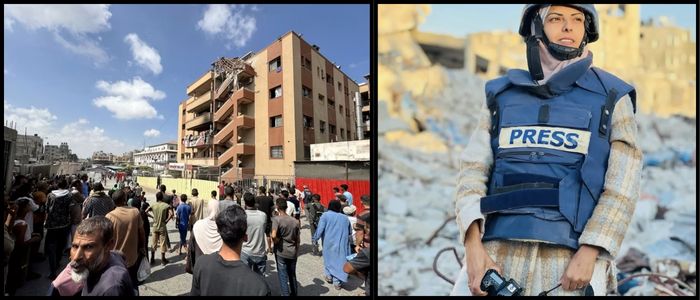Hospital spokesman Dr. Mohammad Saqer confirmed that five journalists and four health workers lost their lives. The journalists killed were Mohammad Salama, a cameraman, Hussam Al-Masri, who worked as a contractor, Mariam Abu Dagga, who contributed to multiple outlets, along with freelancers Moath Abu Taha and Ahmed Abu Aziz.
Gaza’s Civil Defense reported one of its crew members also died in the strikes.
Witness footage showed chaos unfolding as medical staff and reporters were caught in the second strike, which shook the building and forced people to flee. The attack destroyed a balcony often used by reporters for coverage of Khan Younis.
Israel’s Response and Investigation
Israeli Prime Minister Benjamin Netanyahu admitted journalists and emergency responders had been killed, calling it a “tragic mishap.” He expressed regret and said the military was investigating the incident. Brig. Gen. Effie Defrin of the Israel Defense Forces (IDF) stated that the strike targeted a camera on the hospital roof allegedly used by Hamas for monitoring Israeli forces.
According to an Israeli security official, forces first struck the camera with a tank shell and then fired a second round that hit rescuers.
Defrin emphasized that the IDF does not intentionally target civilians but operates in “an extremely complex reality.” He said any incident of civilian harm is examined by the military’s review mechanisms.
Global Reaction and Condemnation
International outrage quickly followed. The United Nations, humanitarian groups, and press organizations condemned the strikes, describing them as one of the deadliest attacks on media workers since the Gaza war began. UN Secretary-General Antonio Guterres demanded protection for civilians, medical staff, and journalists, and called for an impartial investigation.
The Palestinian Journalists Syndicate labeled the event a “heinous massacre,” while humanitarian organizations such as Doctors Without Borders denounced the targeting of Gaza’s only partially functioning hospital in the south. Countries including Canada, the UK, Germany, Switzerland, Qatar, Saudi Arabia, and Kuwait also voiced condemnation.
Another journalist, Hassan Douhan, was killed separately the same day when he was shot in Khan Younis. The Committee to Protect Journalists said that before this incident, 192 journalists had been killed since the start of the war in Gaza.
Many organizations and colleagues mourned the loss of Mariam Abu Dagga, who had been reporting from Gaza despite dangerous conditions. She had focused her work on hospitals struggling to save children from starvation.
Tributes were also paid by groups she collaborated with, describing her death as heartbreaking.
Other networks condemned the killings, accusing Israel of targeting journalists and committing violations of international law. Hamas said the strikes aimed to silence those reporting on the war.
Two weeks earlier, several other journalists were killed in a separate strike in Gaza City, raising further questions over the safety of media workers in the conflict.
As fighting continues, U.S. President Donald Trump claimed the war could end “within the next two to three weeks,” though no clear details were provided. Families of hostages expressed hope that his statement would mark a deadline to their suffering.
World

Outrage After Five Journalists Killed in Gaza Hospital Strike

Israel is under sharp criticism after two back-to-back strikes on Nasser Hospital in Khan Younis killed at least 20 people, including five journalists and several medical workers. The Palestinian Ministry of Health said the attacks, carried out within minutes of each other, hit the hospital’s fourth floor and later struck emergency crews and ambulances that rushed in after the first blast.















